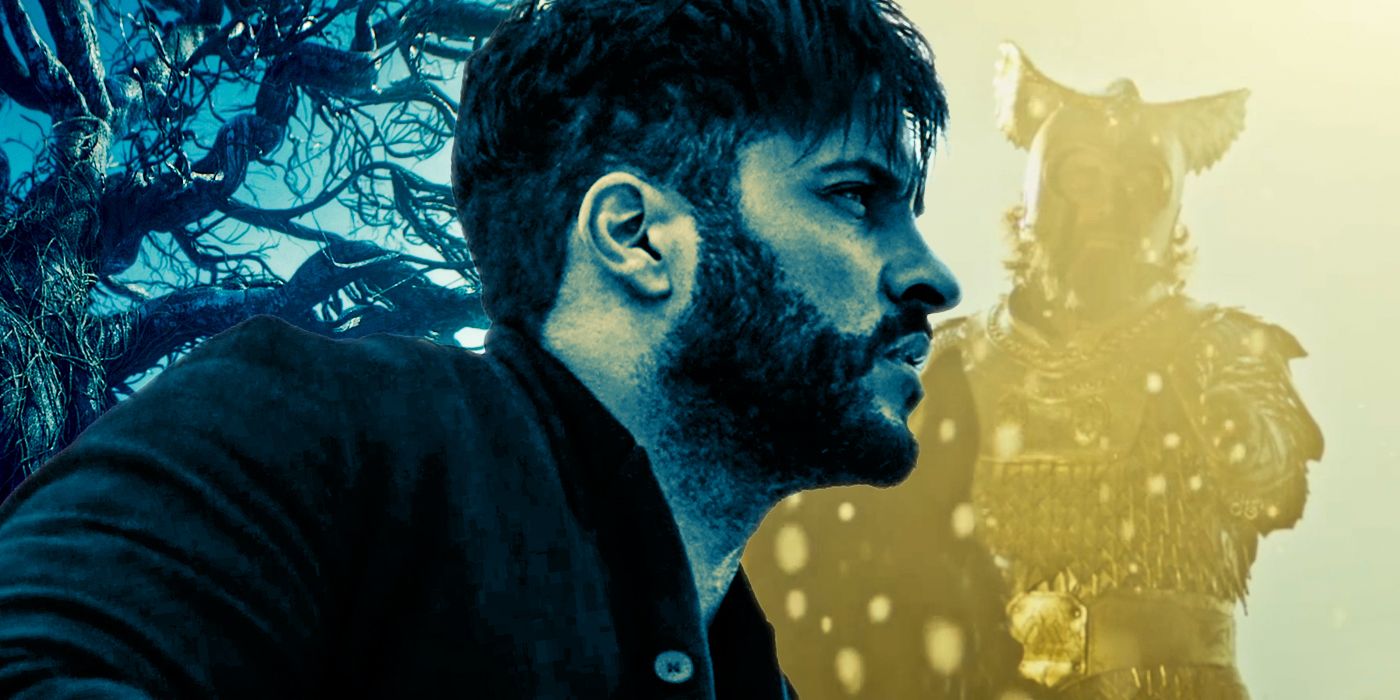
American Gods season 3's cliffhanger ending sees Shadow Moon make the ultimate sacrifice for Mr. Wednesday, but is this really the end of the line for Shadow? The future of American Gods is now uncertain after Starz opted to cancel the series, but the producers remaining optimistic that it will continue elsewhere. If American Gods season 4 does happen, there's considerably more story from Neil Gaiman's original novel left to tell.
After the New Gods made Shadow a wanted man at the end of American Gods season 2, he spent much of season 3 lying low in the small town of Lakeside. Meanwhile, Shadow's late wife Laura Moon returned from the dead more determined than ever to get her revenge on Mr. Wednesday, and cut a deal with the New Gods in order to kill him with his own weapon, Gungnir. With Mr. Wednesday dead, Shadow decides to fulfil the promise he made to his father and hold a vigil for him by hanging from the World Tree, Yggdrasil, for nine days. It's an ordeal that would kill a mortal, but which Shadow believes it could be the key to unlocking his own potential as a god.
Meanwhile, Technical Boy's search for the reason behind his disruptive glitches culminates in the sub-basement of the building where the New Gods have been creating Shard, a sinister "state of the art life management system" designed to bring the world under the New Gods' thrall. As Technical Boy defies Mr. World, Bilquis works to save Shadow from Mr. Wednesday's plans for him. Here's a breakdown of the biggest moments and mysteries in American Gods season 3's ending, and how the story could continue in season 4 if the show is saved from its cancellation.
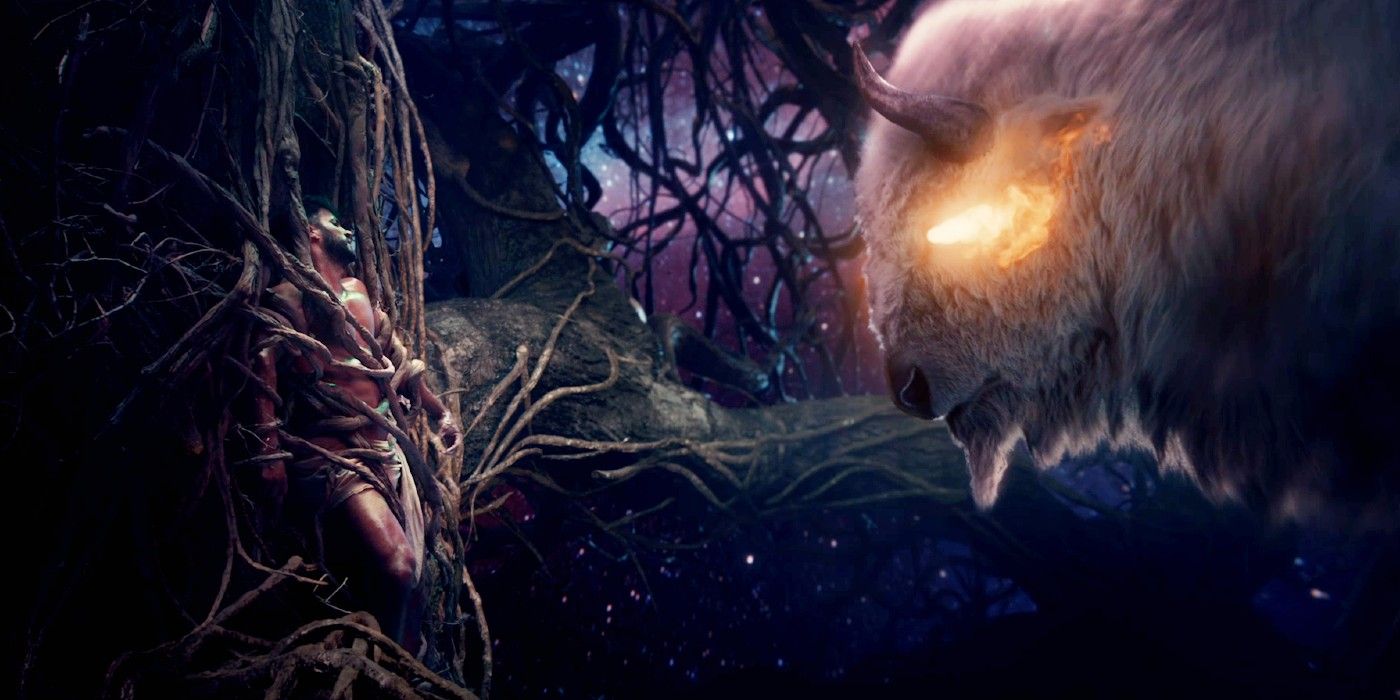
Shadow Moon's vigil for Mr. Wednesday is an homage to Odin's own ordeal on the branches of Yggdrasil. In Norse mythology, the branches and roots of this great tree are said to hold the Nine Worlds of the cosmos - Asgard, Midgard, Niflheim, Muspelheim, Alfheim, Svartalfheim, Jotunheim, Vanaheim, and Helheim. In the classic Norse poem Hávamál, Odin relates the story of how he sacrificed himself on Yggdrasil and dedicated his sacrifice to himself, in order to obtain the tree's hidden knowledge. He wounded himself with a spear and hung for nine nights without food or water, but was rewarded with the knowledge that he sought.
Though Shadow is ostensibly fulfilling his obligations to his father, he has an ulterior motive; like Odin, he hopes to gain something by hanging himself from Yggdrasil. Ever since learning that Mr. Wednesday is actually his father, Shadow has come to believe that he is also a god - a belief that's been reinforced by small acts of magic, like predicting the date that Lakeside's clunker would fall through the ice, or willing a snowstorm into existence. Shadow does appear to have some power over the elements of snow and ice; when he becomes desperately thirsty during his vigil, he calls out for "water" and snow begins to fall, at first refreshing but then quickly overwhelming him.
Unlike Odin, who survived his hanging from Yggdrasil, Shadow dies a violent death when the branches of the World Tree pierce his body. He wakes up on an airplane with Mr. Wednesday, who explains that they are in a place somewhere between life and death. Mr. Wednesday then jumps out of the plane in a symbolic escape from death, while Shadow is left trapped helplessly in his seat. Back on Earth, just in case there was any doubt, Mr. Ibis confirms that Shadow is dead as his body is pulled into the embrace of Yggdrasil. However, given the tricky nature of the gods, there's more than one way that Shadow could be brought back to life.

Shadow Moon might know a thing or two about con artistry, but his father has been in the game a lot longer. During their final conversation, Mr. Wednesday reveals that he began planning his son's sacrifice before Shadow was even born. By the 20th century there were almost no true believers in the Norse gods left in America; the New Gods were on the rise, and the powers of the Old Gods had dwindled. To reverse this, Mr. Wednesday plotted to have a half-mortal son who would one day hang himself on Yggdrasil in a sacrifice human dedicated to Odin: a single act of worship powerful enough to restore Wednesday to his former glory.
Wednesday's original plan was to get close to Shadow, reveal that he was his father, and make Shadow sacrifice himself out of love. However, when Shadow's love for him was not particularly forthcoming, Wednesday changed tactics and focused on hooking Shadow in with the idea that he could become a god himself.
Back on Earth, as Shadow dies and is consumed by the tree, Mr. Wednesday's body disappears and an ominous storm roils on the horizon. When Czernobog wonders if Odin's death is the death of the Old Gods, Mr. Ibis counters that it could be "something much worse." If Mr. Wednesday has become the all-powerful All-Father once again, the Old Gods and the New Gods are now on more even footing, the war between them is back on, and the resulting chaos could tear America apart.
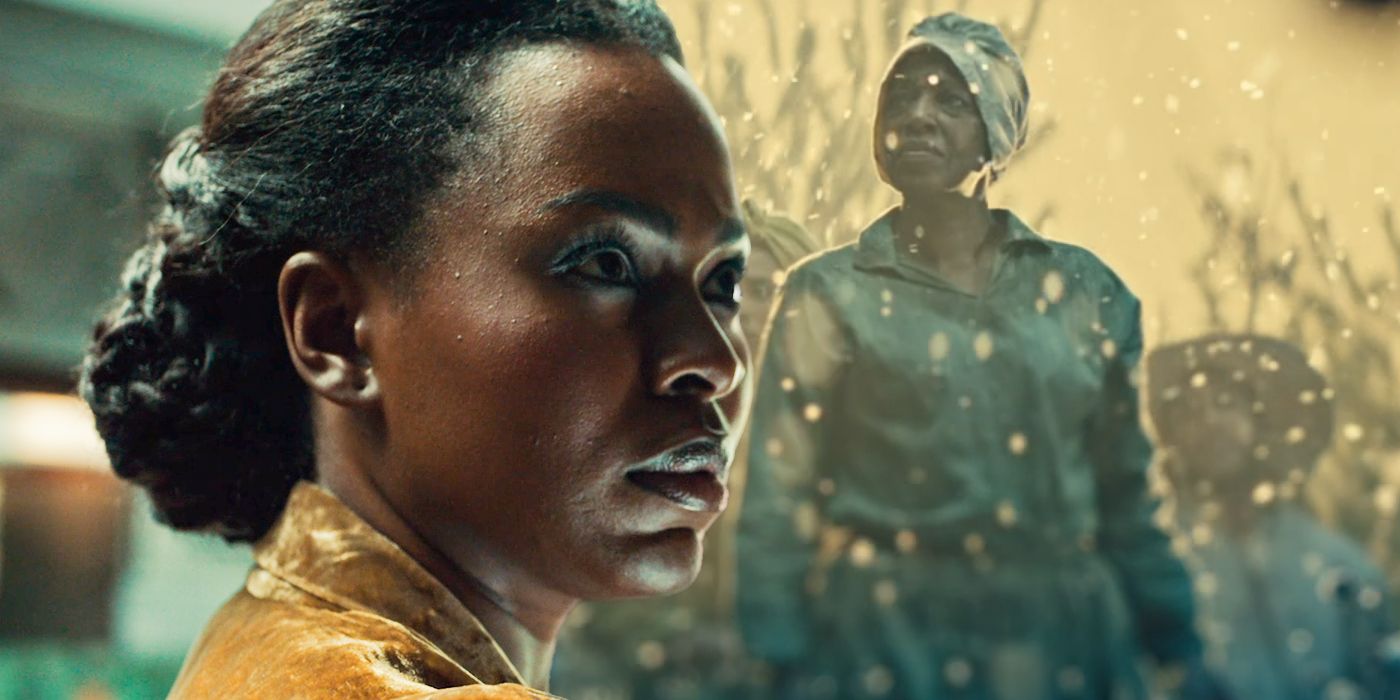
Though American Gods has been broadly faithful to Gaiman's novel, there are a number of significant changes - including an expanded role for Bilquis. Her story in season 3 is entwined with the introduction of the Orishas, a pantheon of spirits from the religion of the Yoruba people, who brought their gods with them when they were trafficked to America as slaves. The Orishas are first seen at the start of American Gods season 3, episode 4, "The Unseen." In this Coming To America story, a slave working in a cotton field calls out to the Orishas for help and four of them appear: Chango, a spirit of power and war; Oshun, a spirit of love and purity; Yemoja, the spirit of water; and Aye, a spirit who represents the earth itself. Later in the season it's revealed that Bilquis was originally one of the Orishas as well, but forgot her original identity when she was transformed into the Queen of Sheba by the belief and worship of her people.
Through the Orishas, American Gods sets up a conflict between the two halves of Shadow Moon's heritage: his Norse father, and his African-American mother. Before he begins his vigil for Odin, Shadow has a dream in which the cotton field slaves from "The Unseen" call to him from one side, and Odin extends a hand to him from the other. Shadow lets Odin pull him up onto the horse, choosing Mr. Wednesday's promise of greatness and the tantalizing idea of becoming a god himself. However, in going through with his lonely sacrifice, Shadow overlooked the power in his mother's bloodline; as the Orishas say, "I is we and we is power." Towards the end of his vigil, as Shadow is dying and starting to realize the mistake he's made, he sees his mother's ancestors again, watching him in solemn silence.
It's not too late for Shadow to be saved, however. The finale opens with Eugenia, the midwife who delivered Shadow Moon, telling Bilquis a story about a hen who always laid two eggs, whose yolks would give a person the strength to last the whole day without any other food. Eugenia says that her time on Earth has come to an end (symbolized by the pennies in her eyes and the presence of Iku, an Orisha spirit who is the personification of death). As she dies, she passes on the task of protecting Shadow from his father to Bilquis. To do this, Eugenia says, Bilquis must find "The Other, his soulmate" and convince Shadow that in order to unlock his true strength he must unite with that person. The vision that follows implies that "The Other" is Laura Moon, and Bilquis seeks Laura out at the Center of America Motel.
Though Laura's role in American Gods is also slightly different from the novel, the fundamentals of the character remain the same: she is working to disrupt the plans of the Old Gods and to protect Shadow. If Laura is "The Other" who completes Shadow's power, she may well have a godly heritage - and as someone with experience recovering her own lost identity, Bilquis could help Laura find hers. Given the bonds she formed with Mad Sweeney and Liam Doyle, Laura could have a connection to the Celtic deities. Then again, Laura could also be a red herring, and the true other half of Shadow's power could lie elsewhere.
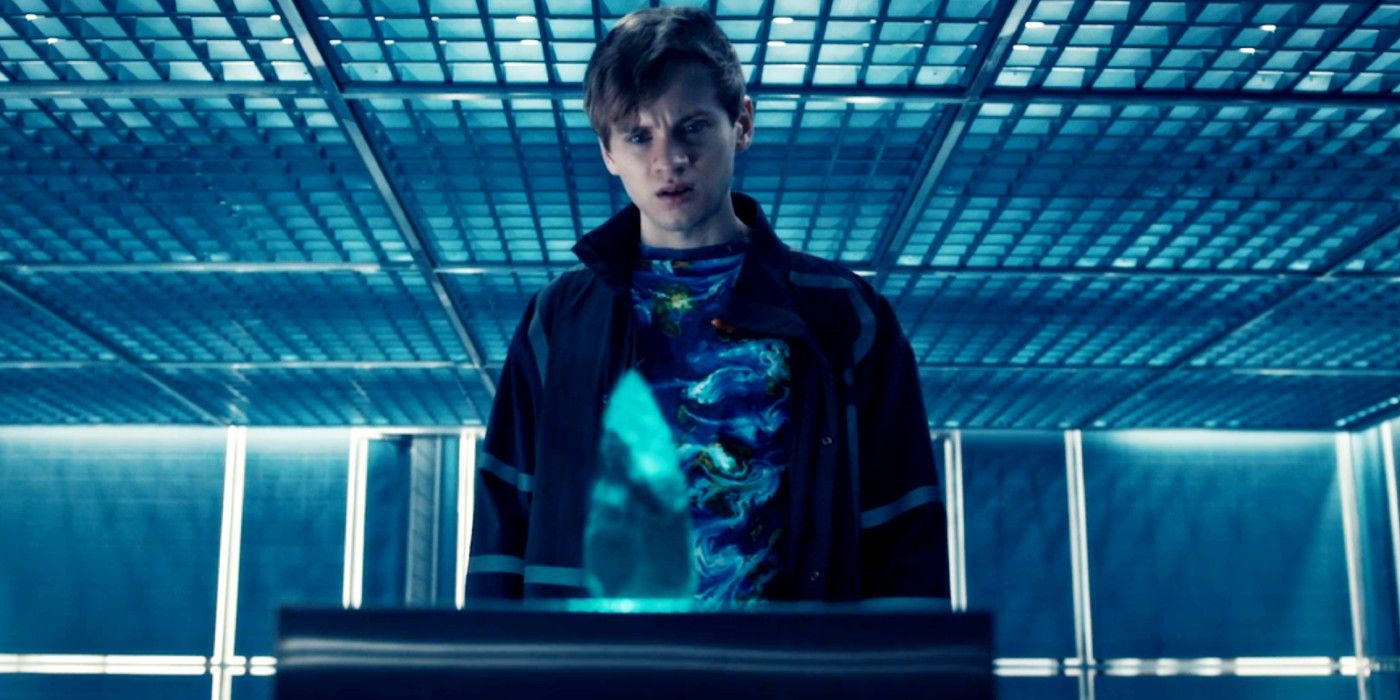
In American Gods season 3, Technical Boy rebelled against Mr. World's hold over him, growing increasingly unstable while also discovering greater strength within himself. While attempting to get to the bottom of the glitches he learned that the key to troubleshooting them was something called "Artifact One." In American Gods' season 3 finale, Technical Boy reaches the sub-basement where Artifact One is located and is disappointed to discover that it's something that seems quite untechnical - a rock. When he grabs hold of it, however, he experiences a vision of innovations dating back to the early days of humanity, including the first atom bomb, the discovery of electricity, and the invention of the printing press. The very first thing he sees is the rock in his hand being struck to create sparks that light a fire.
As Mr. World explains before trapping Technical Boy in the sub-basement, Artifact One is his totem, and acts as a mnemonic to unlock the memories that Technical Boy has been cut off from. Like Bilquis, Technical Boy is far older than he realizes, and is in fact one of the oldest of the Old Gods. He is the god of human innovation, and has changed and forgotten himself many times over the years as humanity passed through different ages of technological advancement. Because humanity has always been creating and inventing and evolving, Technical Boy has always been worshipped, and his power never waned like the rest of the Old Gods. This means that he is both one of the Old Gods and one of the New Gods, forming a bridge between the two factions.
If Artifact One is the flint used to create the first man-made fire, then Technical Boy's original identity could be Prometheus, the Titan who stole fire from the gods and gave it to humanity. This would fit with Technical Boy's petulant, sneering attitude, as Prometheus traditionally represents not only humanity's irrepressible (and often reckless) pursuit of knowledge, but also defiance of the gods.
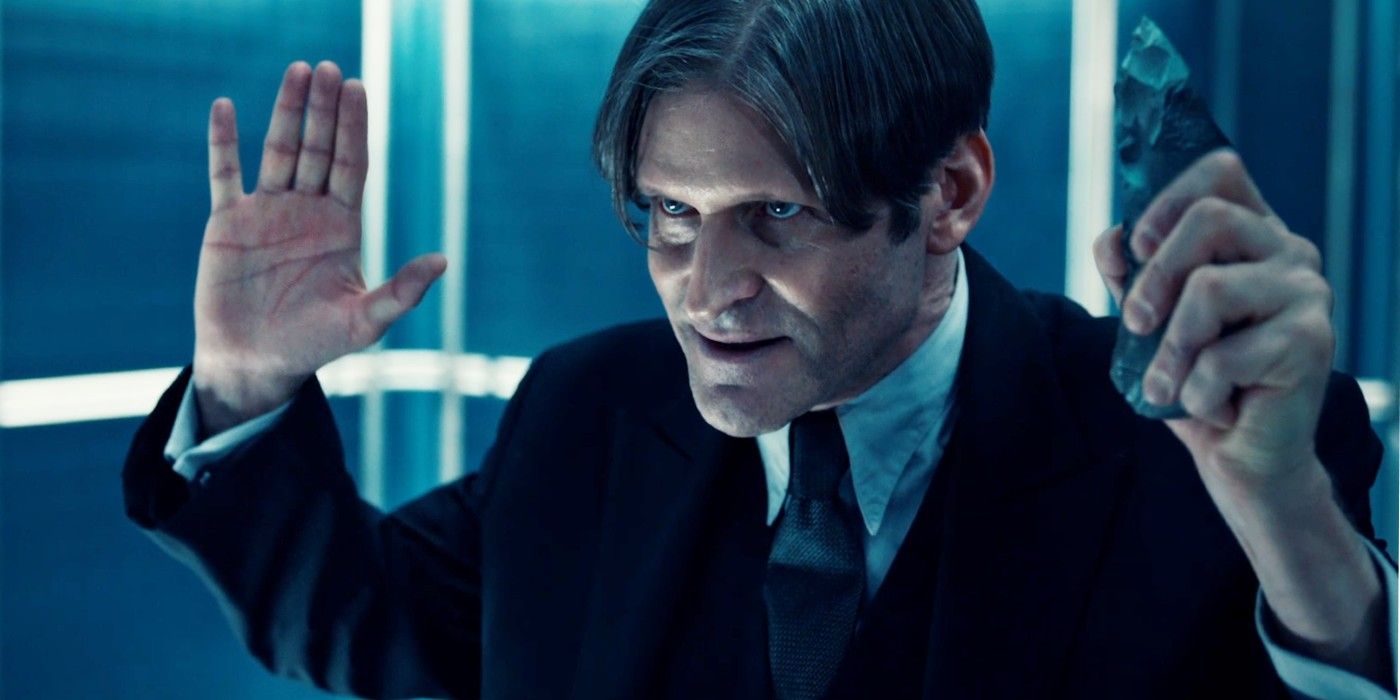
Warning: MAJOR SPOILERS from the American Gods novel ahead.
Mr. World's exposition about Technical Boy's past is also a clue to Mr. World's own identity. Though his name is left a mystery in American Gods' season 3 finale, between his cryptic final words and his penchant for changing his appearance it's possible to piece together who "Mr. World" really is. As revealed in Gaiman's novel, World is actually the Norse god Loki, who is known for his acts of mischief and trickery and frequently uses shape-shifting to achieve his goals.
A more subtle clue to this identity is the song that Mr. World whistles as he leaves. It's the same song that Laura Moon kept hearing in Purgatory earlier in the season, and which was revealed to be "Schwieger's Requiem of Balder." In Norse mythology, Balder was Odin's son and was immune to any injury, so the other gods made a game of throwing things at him just to watch them bounce off harmlessly. In one of his most malevolent acts, Loki tricked the blind god Hodr into throwing a branch of mistletoe at Balder, knowing it was the one thing that could hurt him. Baldur died, and as punishment for his crime Loki was sentenced to spend the rest of eternity in a cave, bound to a rock by his sons' entrails, while a serpent dripped venom on his face.
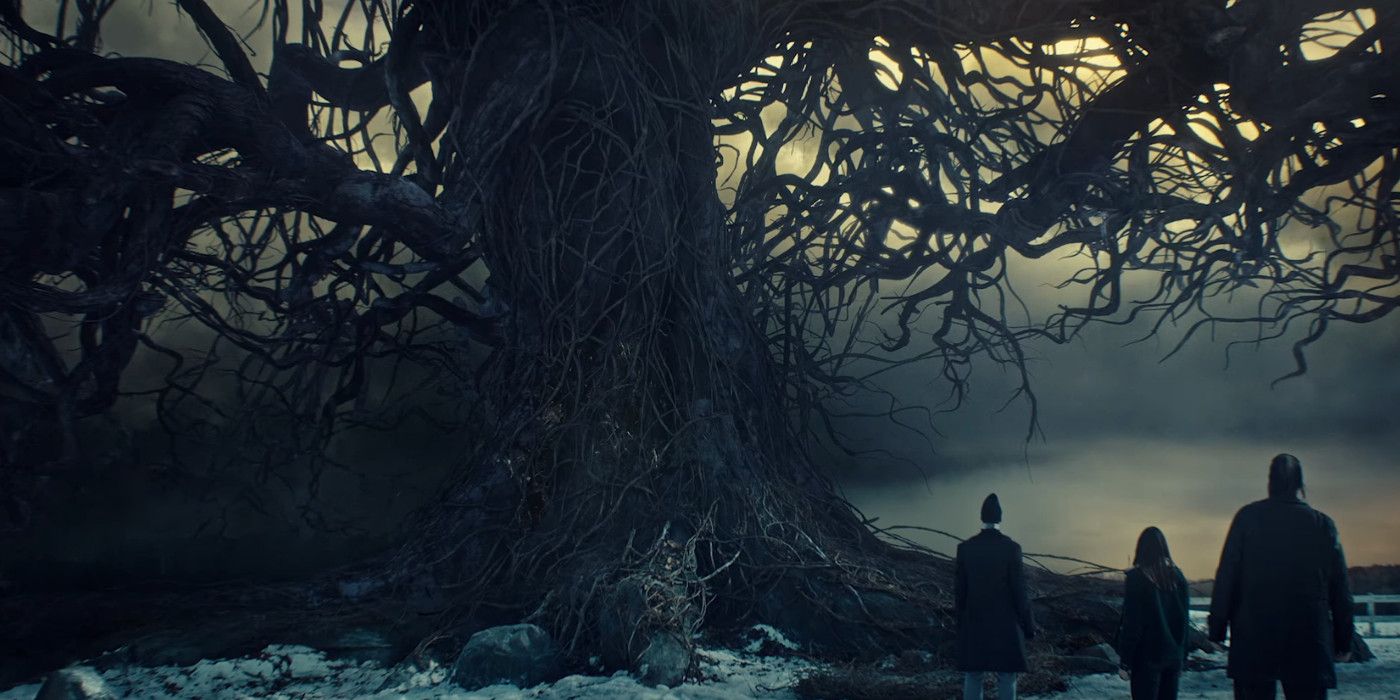
Though Shadow's death might seem like a definite ending for American Gods, given that he's the protagonist of the show, Gaiman's novel doesn't end with the sacrifice on Yggdrasil. In the original story, Shadow is resurrected and the conflict between the Old Gods and the New Gods continues. The storm that brews after Mr. Wednesday's body disappears teases that the darkest chapter of the story is still on the way, and with several mysteries left unresolved it's clear that this is not the end.
American Gods may have been canceled by Starz, but Gaiman (who also serves as an executive producer) has said that the show is "definitely not dead," and production company Fremantle has stated "we are exploring all options to continue to tell this magnificent story." Deadline reports early rumors that either Amazon or Netflix could potentially pick up American Gods for a fourth season; Amazon already distributes the show internationally, and Netflix is developing a TV series based on another of Gaiman's novels, The Sandman. While American Gods' struggling ratings on Starz presumably led to the decision to cancel the series, it could find a bigger audience by moving to one of these major streaming services.
Gaiman has said that the original plan for American Gods was to adapt the story across five seasons. Between the Starz cancelation and criticisms of the show's pacing, however, it might be better if American Gods season 4 completely wraps up the story and brings it to a satisfying conclusion.
from ScreenRant - Feed https://ift.tt/3rKbGYH
via IFTTT







0 comments:
Post a Comment